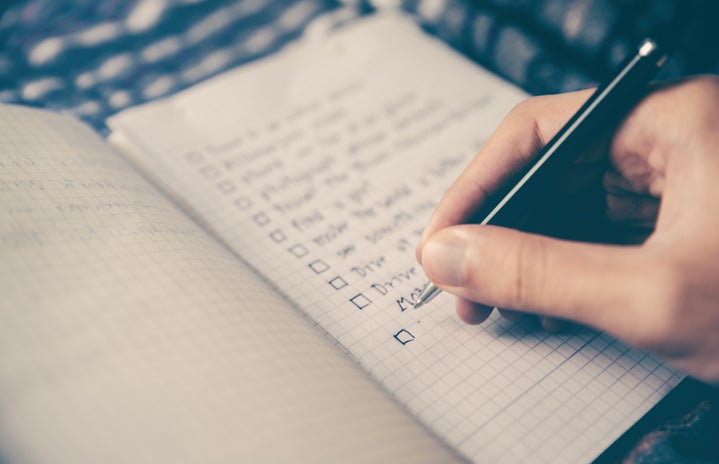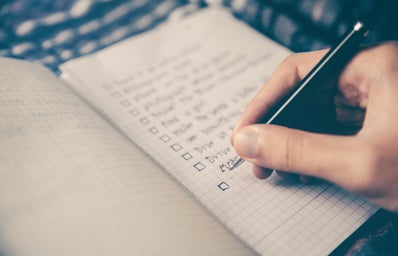Okay, wait. Before you guys say, “Poems are so hard,” and “Why change up my style of journaling?” hear me out. Yes, going about your day and just ranting about life in your journal can be a perfect way to express your feelings (and I definitely encourage that as well). But have you ever stopped to wonder: if you took the time, could you take all those raw, bubbling emotions throughout the week and write something beautiful? I know it may sound tricky, but no worries! Here, I’ll break down the steps that could help you start your poetry, and who knows? You may become inspired by your words, tapping into a part of yourself that otherwise would not have been awakened.
WHY DO POEMS OVER SIMPLE JOURNALING?
When people think of journaling, I bet most of you think of the word in its most “traditional” sense: taking the time to put pen to paper and keep a written account of your trials and tribulations throughout the week. Here is when one lets their feelings out, describing emotions and details on how life has been treating you. I have done this style of journaling for most of my life and never wanted to try something different since it gave me the comfort I needed. But one day instead of going about my usual process of jotting down all my feelings, I took the time and wrote a single word followed by a period. Then, I proceeded to write another word followed by a period. The next thing I knew, I had so many singular words, line after line, that I filled an entire page with verses comprising of just one word. After looking up from my work, I realized I had just written a poem without even meaning to. The release it gave me afterward was just what I needed. From then on, I was hooked, blending the poems into my regular journaling whenever I had the chance. Some days, I tried to make the words rhyme. Other days, I just wrote what was in my heart. But no matter how I did it, I could write these short snippets of my life. So, why poems? Because I believe that they can grasp something that “traditional” journaling can’t. It leaves everything up to interpretation. It doesn’t require the use of detailing every last thing. You could always look back on it and add to it in the future. No rules. Just words.
BUT I’M NOT A WRITER, HOW CAN I START A POEM IF I’M STUCK?
Look, I know that not everyone is trying to become a best-selling author. This method in no way requires you to try and be one. Remember, at the end of the day, no one else will be reading this except the most important person of all: you. As such, don’t think of this time as an assignment for class where you have to reread it repeatedly until it’s perfect. Don’t get me wrong. Sometimes, even I find myself doing that. I’m always trying to find the best word to encapsulate the genuine emotions I am currently experiencing. Maybe you don’t care as much about the precise wording as I do and that’s totally okay. It’s about your feelings and perhaps even revealing some underlying ones the writing brought out of you. See, that is the beauty of poetry; sometimes, it can take you places you never expected. So, my advice on starting a poem is to start with one word, just as I did, and see where it takes you. Another idea could be to begin each sentence with the exact phrase, such as “I feel.” Or, if you have no idea at all, take a moment and write about your current surroundings. What do you hear? What’s the mood of the room? Take the time and let those senses guide you somewhere towards inspiration.
Final thoughts
Poems have unlocked a deeper part of myself that simple journaling could never fully encompass. Poems come in all different styles. Some can be written, some can be crossed-out words from an article, and some can even be images of words collaged to form a beautiful story. There is so much to choose from when starting poetry. And since it is all about ensuring that your mental health is balanced, there is no pressure to see if your writing constitutes what others deem “good poems.” Who cares! As long as you’re having fun and the creativity is flowing from your fingertips, then the work is done. I love getting into a writing mindset where nothing else matters, just me and the page. This is what I hope you get to when writing. Make it personal and profound. Go against the grain of what you think it should sound like. When you have those moments where you feel you have written the worst thing ever, sit back and leave it alone for a couple of days. After giving the poem a chance to breathe and evolve, I bet you’ll feel differently about it when you return to it. My favorite part about writing poems is looking back on the piece I had just created and reveling in the fact that I could make such a beautiful piece. So, let the words guide you to transform your work into little bundles of art.
Hopefully, I have inspired some of you to go on your own poetry journeys. May the power of your raw emotions guide you to create beautiful works of poetic art!



